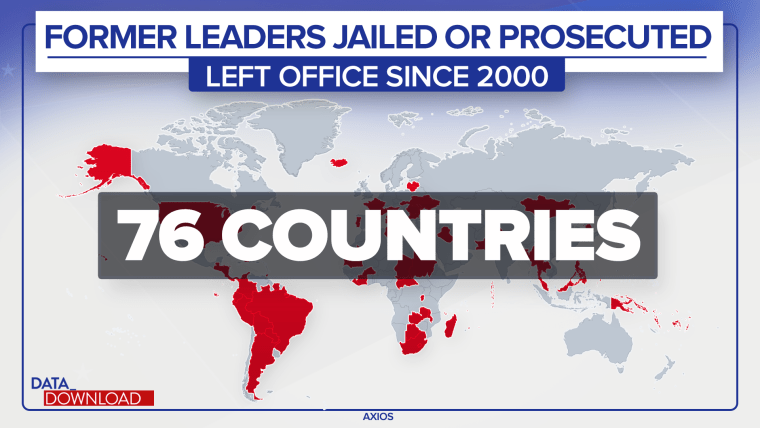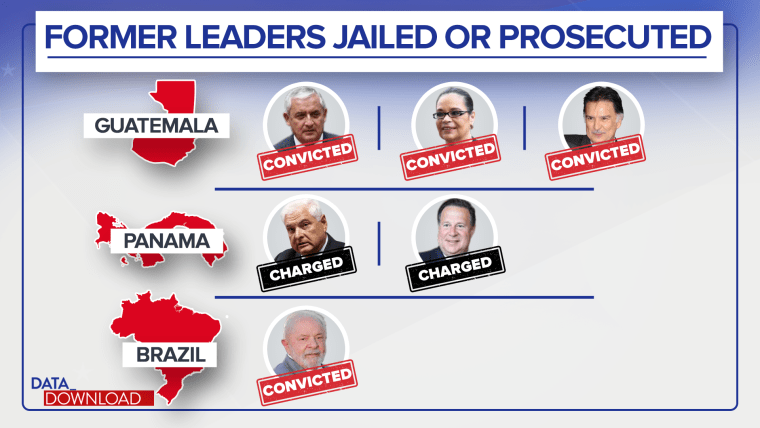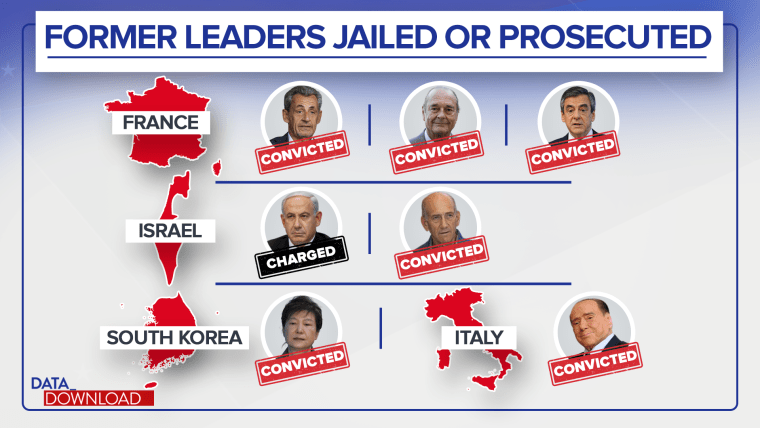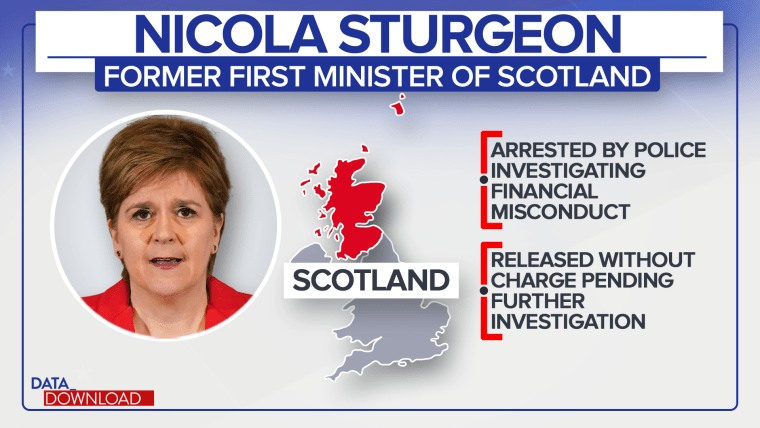WASHINGTON — The arraignment of former President Donald Trump last week was an unprecedented, watershed event for the country. But looking at other nations, it wasn’t new terrain.
Since 1980, about half of the world’s countries have had former leaders jailed or prosecuted, according to the political news outlet Axios, not including impeachments or coups. The site went so far as to build a map of countries where leaders have been jailed or prosecuted after having left office since 2000. In that sense, the U.S. is just joining a club that already has scores of members spread around the globe.

NBC News research finds those cases reflect a broad swath of different stories that touch a wide array of governments and forms of government.
Let’s start by looking to the south, in Central and South America.

In Guatemala, former President Otto Pérez Molina and his vice president, Roxana Baldetti, were both found guilty of corruption last year. They had been forced to resign in 2015 and were sentenced to 16 years in prison for their parts in a tax fraud scheme.
That followed the arrest and conviction of Alfonso Portillo, who was president of Guatemala from 2000 to 2004. He pleaded guilty to attempting to launder $2.5 million through U.S. banks and was sentenced to 70 months in prison.
A little farther south in Panama, two former presidents, Ricardo Martinelli and Juan Carlos Varela, have been called to stand trial in a massive money-laundering probe that has caught dozens of people in its net. Martinelli was previously arrested in the U.S. and extradited to Panama in a different spying and corruption scandal but was found not guilty in court. He has called himself the “greatest businessman in the country” and plans to run again in 2024.
And in Brazil, the story is … complicated.
Last year, Luiz Inácio Lula da Silva, known as Lula, won the closest election in the country’s history over Jair Bolsonaro. It was actually a re-election for Lula, who also held the office from 2003 to 2010, but there was a criminal conviction in the meantime. In 2017, Lula was convicted in an international corruption scandal, but he was able to run for office again after his case was annulled. A judge held that the court that tried him didn’t have jurisdiction over his case.
The result: Lula is serving as Brazil’s president and awaiting a fresh trial, which will be held, at some point, in Brasilia.
The stories of arrested and convicted world leaders extend far beyond Central and South America. They reach across the Atlantic and Pacific oceans to powerful economic allies with their own rich democratic traditions.

France has had multiple former leaders charged and convicted.
In 2021, former President Nicolas Sarkozy was sentenced to prison for corruption and influence peddling. He lost an appeal this spring and is required to wear an electronic bracelet for one year as part of his three-year prison sentence, the two other years of which were suspended.
Back in 2011, former French President Jacques Chirac was found guilty of embezzling public funds to illegally finance his political party. He was sentenced to two years in prison, suspended.
And in 2020 former French Prime Minister François Fillon was convicted of fraud and misuse of funds. He lost his appeal last year and was given a four-year prison sentence, three years of which were suspended.
In Israel, Prime Minister Benjamin Netanyahu has been indicted on corruption charges, including fraud, breach of trust and accepting bribes. The corruption trial is underway even as Netanyahu sits in his country’s most powerful office. He would be forced to step down if he’s found guilty.
And former Israeli Prime Minister Ehud Olmert served 16 months in prison in 2016 and 2017 for taking cash from an American businessman and bribes in connection with a housing project when he was mayor of Jerusalem, from 1993 to 2003.
In South Korea, former President Park Geun-hye served five years in prison after having been found guilty on corruption charges. Park was president from 2013 to 2017. The court found she pressured South Korean companies to give millions to foundations run by a friend and sentenced her 22 years in prison in 2018. She was released early at age 69 because of poor health.
And in Italy, former Prime Minister Silvio Berlusconi died last week at age 86 after having been the country’s leader off and on while he faced a steady stream of criminal cases for years. They included cases involving false accounting, bribery, abuse of office and having sex with an underage prostitute.
Ultimately, only one charge stuck, tax fraud, but Berlusconi held the office of prime minister three times for a total of about nine years over 18 years.
Beyond those cases, Trump wasn’t even the only former government leader to be arrested last week.

On Sunday, Nicola Sturgeon, a former first minister and leader of the Scottish National Party, was arrested and accused of financial misconduct. She was released without being charged pending further inquiries. Police are reportedly investigating what happened to roughly $850,000 in donations given to Sturgeon’s party. She maintains she is innocent.
In other words, what happened to Trump last week may have been “unprecedented” in the U.S., but for many other countries, it’s not exactly groundbreaking stuff.
After Trump’s indictment, the U.S. doesn’t look like an outlier around the world. It simply looks like a lot of other countries whose former leaders have run into legal trouble.
CORRECTION (June 18, 2023, 8 p.m. ET): A previous version of this article misspelled the last name of the former president of Brazil. He is Jair Bolsonaro, not Bolsinaro.